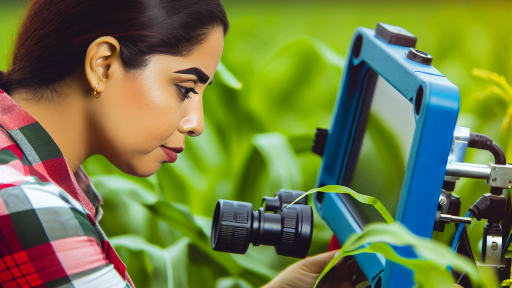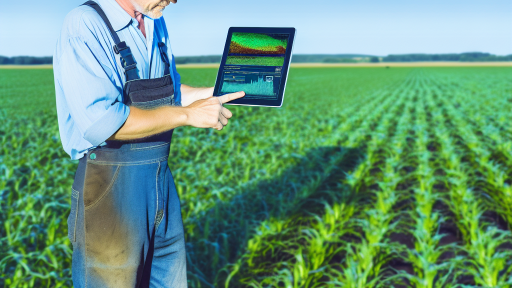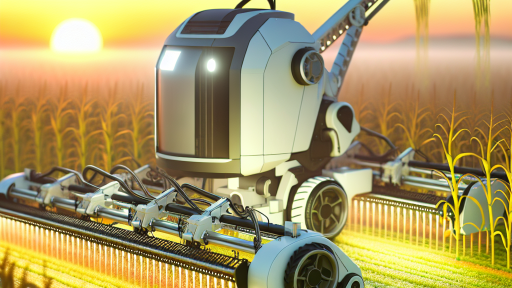Introduction to Smart Irrigation
Definition of Smart Irrigation
Smart irrigation involves the use of technology to optimize water usage.
This method enables farmers to monitor and manage watering efficiently.
It utilizes sensors, weather data, and automation to improve irrigation practices.
Importance of Smart Irrigation
Smart irrigation is crucial for sustainable agriculture.
By conserving water, it helps protect local water resources.
This approach enhances crop yields through precise watering methods.
Moreover, it reduces labor costs associated with traditional irrigation systems.
Farmers can also adapt to changing weather patterns more effectively.
Overall, smart irrigation contributes to the resilience of farming operations.
Benefits of Implementing Smart Irrigation
- Increased water efficiency leads to reduced waste.
- Cost savings are achieved through lower water and labor expenses.
- Crops receive optimal moisture, resulting in healthier yields.
- Environmental impact is minimized by reducing runoff and pollution.
Challenges and Considerations
Implementing smart irrigation requires an initial investment.
Farmers must consider the technology that fits their specific needs.
Training is essential for staff to effectively use these systems.
Additionally, maintenance of sensors and equipment is necessary for long-term success.
Benefits of Implementing Smart Irrigation on Your Farm
Water Conservation
Smart irrigation systems optimize water usage effectively.
They significantly reduce water waste on farms.
Transform Your Agribusiness
Unlock your farm's potential with expert advice tailored to your needs. Get actionable steps that drive real results.
Get StartedBy using sensors, farmers can monitor soil moisture levels.
This approach ensures that crops receive only necessary water.
Cost Savings
Farmers can save money with reduced water bills.
Smart systems also decrease labor costs over time.
Investing in technology may qualify for agricultural grants.
Over time, operational efficiencies will improve overall profitability.
Improved Crop Health
Consistent watering leads to healthier crops.
Smart irrigation helps in preventing overwatering, which can damage plants.
Optimal moisture levels promote robust root development.
Ultimately, this results in increased crop yields.
Enhanced Environmental Impact
Implementing smart irrigation systems benefits the environment.
Efficient water use supports local ecosystems and wildlife.
It contributes to overall sustainability in agriculture.
Farmers can play a role in conservation efforts.
Data-Driven Decision Making
Smart irrigation systems generate valuable data for farmers.
This data helps in predicting irrigation needs accurately.
Farmers can make informed decisions based on specific conditions.
Additionally, they can adjust for weather changes in real-time.
Types of Smart Irrigation Technologies
Drip Irrigation
Drip irrigation delivers water directly to the soil surface.
This method reduces water waste and minimizes evaporation.
Farmers can adjust the flow rate according to crop needs.
Furthermore, it reduces weed growth by targeting specific plants.
Companies like Rain Bird offer advanced drip systems.
Sprinkler Systems
Sprinkler systems spray water across large areas.
Showcase Your Farming Business
Publish your professional farming services profile on our blog for a one-time fee of $200 and reach a dedicated audience of farmers and agribusiness owners.
Publish Your ProfileThey can be stationary or portable, depending on farm size.
Additionally, modern systems feature timers for efficient operation.
For example, irrigation controllers can monitor weather conditions.
This helps prevent overwatering and conserves water resources.
Soil Moisture Sensors
Soil moisture sensors provide real-time data on soil conditions.
Farmers can utilize this information for accurate irrigation scheduling.
They help to avoid under or over-irrigating crops.
Moreover, these sensors can connect to smartphones for easy access.
Companies like CropX specialize in smart soil moisture technology.
Weather-Based Irrigation Controllers
These controllers adjust irrigation schedules based on weather forecasts.
They analyze rainfall and temperature data for optimal scheduling.
This approach enhances water conservation and reduces costs.
Systems from companies like Hunter Industries provide advanced integration.
They can drastically improve irrigation efficiency on the farm.
Automated Irrigation Systems
Automated systems utilize technology for hands-free operation.
Farmers can set schedules and monitor remotely through apps.
These systems enhance precision in water application.
Additionally, they can integrate with other smart farming technologies.
Brands like Irritec offer comprehensive automation solutions.
Benefits of Smart Irrigation Technologies
Smart irrigation technologies provide numerous advantages.
First, they conserve water and reduce waste significantly.
Second, they enhance crop yield and quality.
Additionally, these systems lower labor and maintenance costs.
Farmers can easily monitor and adjust irrigation practices.
Adopting these technologies leads to more sustainable farming.
Find Out More: Precision Agriculture for Sustainable Farming Practices
Assessing Your Farm’s Water Needs
Understanding Water Requirements
Each crop has specific water needs.
Understanding these needs is crucial for success.
You can determine water requirements based on growth stages.
Moreover, environmental factors affect water needs.
Monitoring Soil Moisture
Regularly monitoring soil moisture is essential.
Soil moisture sensors can provide real-time data.
Using these tools, you can optimize irrigation schedules.
This approach helps prevent both over and under-watering.
Utilizing Weather Data
Weather data significantly influences irrigation practices.
Collecting local weather information aids in planning.
Focus on temperature, humidity, and rainfall patterns.
Adjust your irrigation schedule based on forecasts.
Evaluating Water Sources
Identify available water sources for your farm.
Consider using groundwater, surface water, or recycled water.
Showcase Your Farming Business
Publish your professional farming services profile on our blog for a one-time fee of $200 and reach a dedicated audience of farmers and agribusiness owners.
Publish Your ProfileAnalyze each source for quality and sustainability.
This evaluation helps ensure long-term water availability.
Implementing Automated Irrigation Systems
Automated irrigation systems improve efficiency.
These systems utilize sensors to detect soil moisture.
Consequently, they can deliver water exactly when needed.
This technology minimizes water waste significantly.
Conducting Regular Assessments
Regular assessments of water needs are vital.
Seasonal changes may alter your farm’s requirements.
Irrigation practices should adapt to ongoing assessments.
Ultimately, monitoring will help refine your strategy.
Explore Further: Smart Irrigation for Sustainable Farming Practices
How to Choose the Right Smart Irrigation System for Your Crops
Assess Your Crop Needs
Start by identifying the specific needs of your crops.
Different plants have varying water requirements.
Consider the growth stage of your crops as well.
Young plants may need more frequent watering.
Conversely, mature crops might require less water.
Evaluate Your Farm’s Layout
Next, analyze the layout of your farm.
Consider the topography and the size of your fields.
Uneven land may lead to uneven water distribution.
Measure the distance from your water source to the fields.
This will help in deciding on the irrigation system type.
Research Available Systems
There are various smart irrigation systems available today.
Drip irrigation, for instance, delivers water directly to roots.
This reduces water waste and is efficient for row crops.
Sprinkler systems are another option for larger areas.
These systems ensure even coverage across the landscape.
Consider Integration with Technology
Smart systems often integrate with scheduling software.
This allows for precise monitoring and control of water usage.
Look for systems with soil moisture sensors.
These sensors help automate irrigation based on actual needs.
Further technological integration can enhance efficiency.
Analyze Budget Constraints
Budget is a crucial factor when selecting a system.
Calculate not only initial purchase costs but also operating costs.
Consider long-term savings from reduced water usage.
Explore financing options that may be available for farmers.
Investment in smart technology can pay off in productivity.
Seek Expert Advice
Consulting with irrigation specialists can provide valuable insights.
These experts understand the different technologies available.
They can recommend systems tailored to your specific needs.
Furthermore, they may offer installation and maintenance services.
Showcase Your Farming Business
Publish your professional farming services profile on our blog for a one-time fee of $200 and reach a dedicated audience of farmers and agribusiness owners.
Publish Your ProfileExpert advice ensures you make an informed decision.
Learn More: Automating Farm Operations with Sensor Technology
Installation Process: Steps to Setting Up Smart Irrigation
Preparation Phase
Begin by assessing your farm’s specific irrigation needs.
Evaluate the types of crops you are growing.
Capture data on soil types and moisture levels.
This information will guide your system design.
Next, select the appropriate smart irrigation technology.
Consider options like drip irrigation or sprinkler systems.
Designing the Smart Irrigation System
Start by mapping out the irrigation layout for your farm.
Identify areas requiring more or less water.
This step helps optimize water use effectively.
Design the system to connect sensors and controllers.
Ensure that the sensors monitor soil moisture accurately.
Installation Steps
Proceed by installing the chosen irrigation infrastructure.
Place the pipes or tubing in the designated areas.
Connect the sensors where necessary for optimum readings.
Next, install the control unit for wireless connectivity.
Make sure this unit is placed in a protective and accessible spot.
Testing the System
After installation, conduct a thorough test of the system.
Check for leaks in the tubing or pipes.
Ensure all sensors are functioning correctly.
Monitor the control unit to confirm connectivity.
Make any required adjustments to improve performance.
Training and Maintenance
Provide training for your team on how to use the system.
Educate them about interpreting data from the sensors.
Establish a regular maintenance schedule to prolong system life.
Ensure that all sensors remain clean and functional.
Stay updated with any software updates or improvements.
You Might Also Like: Optimizing Water Use with Crop Monitoring Sensors

Maintenance and Troubleshooting of Smart Irrigation Systems
Regular Maintenance Tasks
Perform regular inspections of your irrigation system.
Check the condition of all pipes and connections.
Look for leaks or signs of wear and tear.
Clean filters and emitters regularly to ensure efficiency.
Adjust the system’s settings according to seasonal changes.
Document maintenance performed to track the system’s health.
Calibration and Adjustments
Periodically calibrate your smart irrigation system.
Use soil moisture sensors for accurate readings.
Adjust watering schedules based on weather forecasts.
Ensure that the system responds to real-time data effectively.
Regularly update the software to fix bugs and improve functionality.
Showcase Your Farming Business
Publish your professional farming services profile on our blog for a one-time fee of $200 and reach a dedicated audience of farmers and agribusiness owners.
Publish Your ProfileTroubleshooting Common Issues
Identify common problems such as system failures or leaks.
Check for electrical faults if the system does not activate.
Inspect the moisture sensors for dirt or damage.
Replace faulty components immediately to prevent further issues.
Consult the manufacturer’s guidelines for specific errors.
Professional Assistance
Consider hiring professional help for complex problems.
Regular audits by specialists can enhance system performance.
They can also provide valuable insights for improvements.
Build a relationship with a reliable irrigation service provider.
Stay informed about warranty and service options available.
Case Studies: Successful Smart Irrigation Implementations on Farms
Introduction to Case Studies
Smart irrigation technologies save water and enhance crop yields.
Farmers globally adopt these solutions with great success.
Let’s explore several case studies showcasing smart irrigation implementations.
Case Study: Green Valley Farms
Green Valley Farms implemented a smart irrigation system in 2020.
This system utilizes soil moisture sensors and weather data.
As a result, the farm reduced water usage by 30%.
Additionally, crop yields increased significantly due to optimized watering.
Challenges Faced
Initially, the farm struggled with sensor maintenance.
Over time, the team learned to address these challenges effectively.
Regular training ensured all staff understood the technology.
Results Achieved
Green Valley Farms achieved remarkable improvements.
They reported cost savings on water bills as well.
This investment positively impacted their sustainability goals.
Case Study: Sunny Acres Orchard
Sunny Acres Orchard adopted a smart irrigation system in 2021.
They focused on optimizing water use during the crucial growing season.
The orchard utilized drip irrigation combined with mobile technology.
This approach allowed real-time monitoring and adjustments.
Challenges Faced
Sunny Acres initially faced integration issues with existing equipment.
Consulting with tech experts helped streamline the process.
Continuous updates to the system kept it running smoothly.
Results Achieved
The orchard noted a 40% increase in water efficiency.
Crop quality improved, resulting in higher market prices.
Customer satisfaction also increased as a result.
Case Study: Hilltop Vegetables
Hilltop Vegetables implemented an advanced smart irrigation system last year.
This farm uses automated scheduling based on crop needs.
They experienced less labor dependency due to automation.
Challenges Faced
Adopting new technology can be overwhelming for some workers.
However, ongoing training sessions helped ease their transition.
Results Achieved
Hilltop reported a dramatic drop in operational costs.
They also enhanced their environmental stewardship efforts.
Showcase Your Farming Business
Publish your professional farming services profile on our blog for a one-time fee of $200 and reach a dedicated audience of farmers and agribusiness owners.
Publish Your ProfileSustainability became a core value for the farm.
Impact of Smart Irrigation on Agriculture
Each case study highlights the benefits of smart irrigation.
Farmers can reduce water usage while increasing productivity.
These successes show that smart irrigation is a viable future in agriculture.
Future Trends in Smart Irrigation Technology and Farming Practices
Advancements in Sensor Technology
New sensor technologies are revolutionizing smart irrigation systems.
These sensors gather real-time data on soil moisture and weather conditions.
Consequently, farmers receive timely insights for irrigation management.
Integration of AI and Machine Learning
Artificial intelligence enhances decision-making in irrigation practices.
Machine learning algorithms predict crop water needs more accurately.
This leads to optimized water usage and reduced waste.
Growth of IoT-Based Solutions
The Internet of Things (IoT) connects irrigation systems globally.
This connectivity allows for remote monitoring and control.
Farmers can manage their irrigation systems from any location.
Focus on Sustainability and Conservation
Sustainability is becoming a priority in farming practices.
Smart irrigation technologies promote water conservation efforts.
Farmers are adopting practices that minimize environmental impact.
Emergence of Data-Driven Farming
Data analytics plays a crucial role in modern agriculture.
Farmers can analyze patterns to improve crop yield and resource management.
Data-driven strategies are shaping the future of smart irrigation.
Collaboration Between Tech Companies and Farmers
Partnerships between technology firms and farmers are increasing.
These collaborations focus on developing innovative irrigation solutions.
Together, they aim to address the challenges of water scarcity.
Additional Resources
A comprehensive review on smart and sustainable agriculture using …




